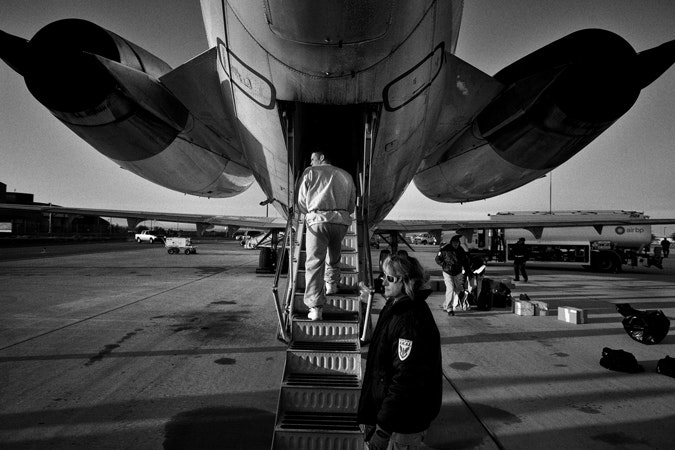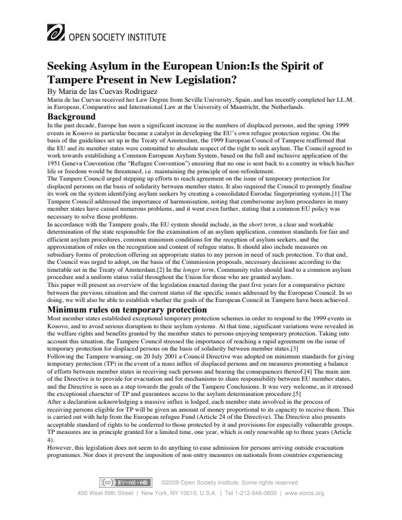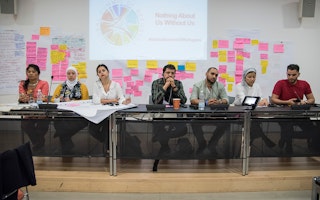Addressing Migration Challenges in a Globalized World
By Magdalena Majkowska-Tomkin

Migration is not a new phenomenon. But, in an increasingly globalized world, violent conflicts and climate change have more people on the move than ever before. At the Open Society Foundations, we believe that migration challenges in Europe need responsible policies that address all aspects of the issue, in accordance with international laws. And we believe that three areas of action in particular—safeguarding migrants’ rights, supporting local communities, and defending civil society and the rule of law—deserve special attention.
Safeguarding Migrant Rights and Promoting Inclusion
One of the most effective ways foundations can defend migrants’ rights is by supporting the civil society organizations that are doing this vital work already.
In Italy, for example, two Open Society grantees, the Association for the Juridical Studies on Immigration and A Buon Diritto, work to ensure that international, European, and national laws are honored during asylum procedures; that conditions are clean, safe, and dignified in the reception facilities where migrants are held; and that no one is deprived of their liberty without judicial oversight and procedural safeguards. Open Society supports groups that provide legal and other support to newly arrived migrants, such as Andalucia Acoge and Servicio Jesuita a Migrantes in Spain, and Medici per i Diritti Umani in Italy.
In Greece, Solidarity Now—a Greek organization which was launched in part by Open Society in 2013 and is today independent—provides housing, basic medical care, and other relief services both to newcomers and to Greeks. Meanwhile, the Open Society Justice Initiative worked with the Greek Council for Refugees to successfully defend a group of Bangladeshi strawberry pickers before the European Court of Human Rights. These workers went on strike to demand pay that was being withheld, only to be shot at and injured by armed guards—an incident emblematic of the poor working conditions and precarious nature of daily life for many migrants in Europe.
Along the same lines, we also support migrant-led organizations that can have a role in shaping the policies that directly impact migrants’ lives. In Greece, these include the Greek Forum of Refugees, and The Melissa Network, both of which are focused on finding ways to empower migrants and bring them together with other members of their communities.
We also support groups that are working to counter anti-migrant stereotypes and myths. More in Common and the International Centre for Policy Advocacy, to take two examples, have developed tools for civil society organizations to engage the broader public. Mediendienst-Integration in Germany serves as a reliable source of information and data for media reporting on migration. With an eye on the future, the German organization Neue Deutsche Medienmacher advocates for increased participation of journalists of migrant background in German media, in order to ensure a diversity of voices and experience in the news media.
At the EU level, however, long-term and comprehensive policies for migration and asylum—policies that go beyond the current narrow focus on reducing unregulated arrivals—remain essential. EU leadership is important because the standards set in the EU are often emulated around the world. That’s one of the reasons why we support the European Migrant Advisory Board, whose goal is to ensure that migrants have a voice in policy debates in Brussels.
Supporting Local Communities
Alongside a defense of migrants themselves, we believe it is also crucial to support those communities who welcome migrants and appreciate the benefits of lawful migration. Despite a media narrative to the contrary, government-supported initiatives—such as the Nansen Refugee Award–winning Humanitarian Corridor Initiative in Italy, for example—are proof that European citizens have taken the lead in welcoming refugees to their new countries. Similarly, we support Refugees Welcome Italia, a grassroots organization which brings refugees and asylum seekers together with Italians who welcome migrants into their homes (thus providing migrants with alternatives to state facilities).
We are also focused on improving conditions at key migrant transit points. That can take many forms; on the Greek island of Samos, for example, we provide legal assistance to asylum seekers. In the Italian town of Ventimiglia, meanwhile, we support legal experts who are monitoring the treatment of migrants on the border with France. In Lesvos, we are working with the Starfish Foundation in support of local initiatives to address local needs. We are working with the Divac Foundation to support similar efforts in Serbia, too. And on the Italian island of Lampedusa, we support the Italian environmental organization Terra! as it works with locals to establish a community garden.
Defending Civil Society and the Rule of Law
Underpinning all of this work is the need to defend open society values—and to hold governments’ feet to the fire when they fail or refuse to do so.
In Croatia, for example, the ombudsperson was prevented from doing her job to verify complaints about police abuse at the borders. Police officers, who themselves were appalled by violations of Croatian and European law, raised the alarm, and expressed fear that, if they didn’t follow orders they would lose their jobs. Actions like these undermine accountability and the rule of law, both of which are part of the lifeblood of democratic institutions.
European citizens have faced persecution, or even criminal charges, for offering humanitarian assistance to migrants. The courts are often the last bastion against this hostility, which undermines the basic freedoms of assembly and expression. The Open Society Foundations are happy to support this fight. This includes our challenge against Hungary before the European Court of Human Rights, over laws passed in 2018 that include making it illegal for individuals or civil society organizations to support asylum or residence applications.
Migrants continue to endure great injustice when they arrive in Europe. The Open Society Foundations are committed to supporting those organization who are fighting for migrants’ rights, with the firm belief that, while the challenges around migration are significant, they are not insurmountable, and that those who are committed to standing up for migrants, in the courts and across their communities, can make greater strides with our support.

Magdalena Majkowska-Tomkin is a division director with Open Society–Europe and Central Asia.


